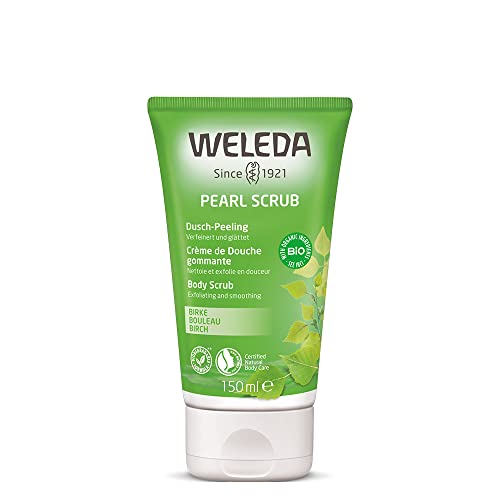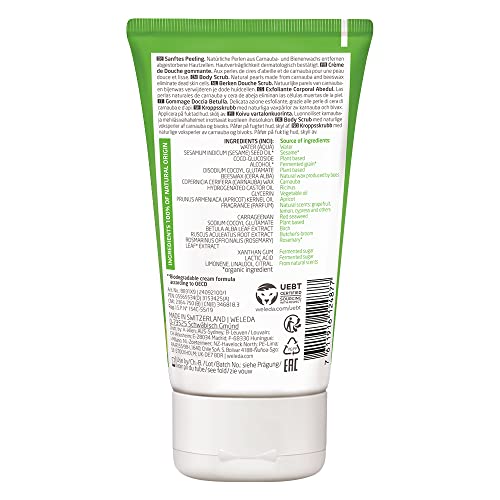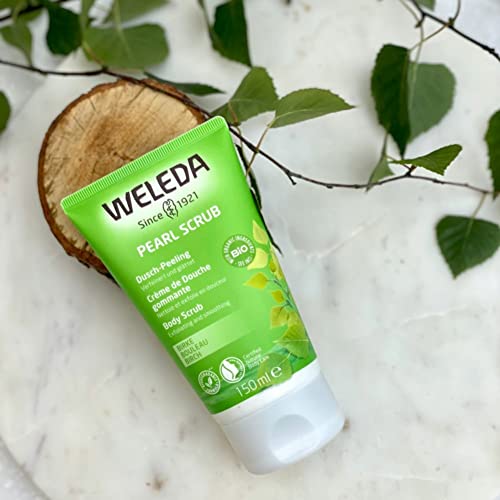




Weleda Birch Body Scrub - Gently Exfoliates, Nourishing Plant Oils, 5 Fl Oz


Linalool
High RiskLinalool is a terpene commonly found in various plants, particularly in lavender and mint. It is primarily used in products for its fragrance and potential antimicrobial properties. Linalool is also utilized in formulations for its ability to enhance the sensory experience of personal care and household products.
Sustai Insights
Linalool offers functional benefits as a naturally occurring fragrance component and may exhibit antimicrobial properties. However, it presents high allergenic potential, with concerns about skin irritation and sensitization. Environmental risks include contamination issues, though it is not classified as a persistent pollutant. Regulatory bodies have noted the need for careful handling due to its allergenic nature. Overall, despite some beneficial attributes, the ingredient carries a high risk profile, warranting cautious use and consideration of safer alternatives.
Limonene
Medium RiskLimonene is a scent ingredient and solvent naturally found in citrus fruits, commonly used in personal care and cleaning products for its fragrant properties. It serves as a flavoring agent and enhances the overall sensory experience of products.
Sustai Insights
Limonene offers functional benefits such as acting as a solvent and fragrance enhancer. However, it carries a high allergenic potential, which can trigger skin or respiratory sensitivities in some individuals. Environmental concerns include moderate persistence and bioaccumulation, along with potential ecotoxicity. Regulatory restrictions necessitate verification in products containing this ingredient. Overall, the risk level is assessed as medium, emphasizing the importance of cautious use, particularly for sensitive populations. Safer alternatives may be considered to mitigate these risks.
Geranial
Medium RiskGeranial is a naturally occurring compound found in essential oils, primarily derived from lemongrass. It is commonly used in fragrances and flavoring due to its lemon-like scent. Geranial acts as a fragrance component and is often included in personal care and cosmetic products.
Sustai Insights
Geranial offers functional benefits as a fragrance enhancer in various products. While it is generally well-tolerated, it has a moderate allergenic potential, and caution is advised for sensitive individuals. Environmentally, it does not appear to be bioaccumulative, but its use is restricted in some verified products. Overall, the risk level is assessed as medium, suggesting that while it is useful, careful consideration of exposure is warranted.
Rosmarinus Officinalis (Rosemary) Leaf Extract
Medium RiskRosemary leaf extract is produced from the leaves of the Rosmarinus officinalis plant. It is commonly used in cosmetic formulations for its potential antioxidant properties and fragrance. The extract may also contribute to the preservation of products due to its antimicrobial characteristics.
Sustai Insights
Rosemary leaf extract offers functional benefits such as antioxidant and antimicrobial properties, which can enhance product stability and shelf-life. It is generally considered low risk for carcinogenicity and reproductive toxicity, but it carries a moderate potential for allergic reactions. Environmentally, it poses low risk with no significant pollutant or bioaccumulation concerns. Regulatory bodies have not placed significant restrictions on its use, although some verified products cannot contain certain concentrations. Overall, the ingredient's risk level is medium, necessitating careful usage practices to mitigate allergic responses.
Hydrogenated Castor Oil
Low RiskHydrogenated castor oil is produced by hydrogenating castor oil, resulting in a thick, waxy substance. It functions primarily as an emollient and thickening agent in various cosmetic and personal care products, enhancing texture and stability.
Sustai Insights
Hydrogenated castor oil serves as an effective emollient and thickener, contributing to product stability and texture. It is generally regarded as low risk for health impacts, with low concerns for carcinogenicity, allergies, and reproductive toxicity. Environmentally, it presents low pollutant potential and does not bioaccumulate. Regulatory bodies impose low restrictions, making it a compliant choice in formulations. Safe usage practices should be followed, and while no significant alternatives are highlighted, its overall risk level remains low.
Xanthan Gum
Low RiskXanthan gum is a polysaccharide, a sugar-based compound produced by the fermentation of glucose or sucrose. It is commonly used as a thickening agent and stabilizer in various food and cosmetic products due to its ability to improve texture and prevent ingredient separation.
Sustai Insights
Xanthan gum serves effectively as a thickener and stabilizer, enhancing product texture and consistency. It is biodegradable and typically derived from renewable sources, supporting sustainability efforts. Health risks are minimal, with low concerns regarding carcinogenicity, allergies, and reproductive toxicity. Environmental impact is similarly low, posing no significant hazards. Regulatory agencies, including the FDA, regard it as safe for use, with no significant restrictions. Overall, xanthan gum is assessed as low risk, making it a suitable ingredient in formulations.
Water
Low RiskWater is a clear, colorless liquid essential for various biological processes. It serves as a solvent in formulations, facilitating the dissolution of other ingredients and enhancing product texture and application. Additionally, water plays a crucial role in hydration and is a key component in many cosmetic and personal care products.
Sustai Insights
Water is an effective solvent and hydrator, contributing to the texture and efficacy of formulations. It is biodegradable and generally regarded as safe, with low concerns regarding carcinogenicity, allergies, and reproductive toxicity. However, excessive water usage can lead to environmental concerns, particularly regarding resource depletion. Regulatory bodies do not impose restrictions on water use in cosmetics. Overall, the risks associated with water are low, making it a safe and essential ingredient.
Sodium Cocoyl Glutamate
Low RiskSodium cocoyl glutamate is a sodium salt of glutamic acid, derived from coconut oil. It serves primarily as a surfactant and mild cleansing agent in cosmetic formulations, contributing to the product's ability to remove dirt and oil while being gentle on the skin.
Sustai Insights
Sodium cocoyl glutamate offers functional benefits as a surfactant, enhancing cleansing efficacy without excessive irritation. It is considered low risk regarding health concerns, including carcinogenicity and allergenic potential. Regulatory assessments indicate no significant environmental hazards or restrictions. Overall, it is a low-risk ingredient, suitable for use in personal care products, with no notable adverse effects or regulatory warnings.
Sesamum Indicum (Sesame) Oil
Low RiskSesamum indicum (sesame) oil is derived from the seeds of the sesame plant. It is commonly used in cosmetic formulations due to its emollient properties and ability to nourish the skin. This oil is rich in fatty acids and antioxidants, contributing to its effectiveness in various skincare products.
Sustai Insights
Sesame oil offers several functional benefits, including moisturization and nourishment for the skin, along with potential antioxidant properties. It is generally regarded as safe, with low concerns regarding carcinogenicity, allergies, and reproductive toxicity. Environmental risks are minimal, and the oil is not known to be bioaccumulative. Regulatory bodies do not impose significant restrictions on its use. Overall, sesame oil poses a low risk, making it a viable ingredient in cosmetic formulations, although consumers should consider potential allergies and choose responsibly sourced products.
Vegetarian Glycerin
Low RiskVegetarian glycerin, also known as glycerol, is a colorless, odorless, and viscous liquid derived from plant sources. It is primarily used as a humectant, solvent, and emollient in various personal care products, helping to retain moisture and improve texture.
Sustai Insights
Vegetarian glycerin offers functional benefits as an effective humectant, promoting hydration and skin smoothness. It is biodegradable and typically sustainably sourced. Health risks associated with glycerin are low, with no significant concerns for carcinogenicity, allergens, or reproductive toxicity. Environmental risks are minimal, and it is not subject to major regulatory warnings. Overall, the risk level for this ingredient is low, making it a safe choice in formulations. Safe usage practices include ensuring proper concentrations in products, and alternatives such as propylene glycol exist but may have differing properties.
Beeswax, Yellow
Low RiskBeeswax, yellow, is a natural wax produced by honeybees, primarily composed of esters of fatty acids and long-chain alcohols. It serves as an emulsifier, thickener, and stabilizer in cosmetic formulations, contributing to texture and consistency. It is commonly used in creams, balms, and lip products.
Sustai Insights
Beeswax provides functional benefits such as enhancing product texture and acting as a natural emulsifier, while also being biodegradable and sustainably sourced. Health risks are minimal, with low concerns for carcinogenicity, allergies, or irritations. Environmental impacts are also low, as it does not bioaccumulate. Regulatory status remains favorable with no current restrictions. Overall, the ingredient poses low risk, making it a suitable choice in cosmetic formulations.
Betula Alba (Birch) Leaf Extract
Low RiskBetula alba (birch) leaf extract is derived from the leaves of the birch tree and is commonly used in cosmetic formulations for its potential soothing and anti-inflammatory properties.
Sustai Insights
Betula alba leaf extract offers functional benefits such as potential skin soothing and anti-inflammatory effects. It is considered to have low health risk, with no significant concerns regarding carcinogenicity, allergies, or reproductive toxicity. Environmentally, it is not known to be a pollutant or bioaccumulative. Regulatory assessments indicate no current restrictions. Overall, the ingredient is assessed as low risk, making it a suitable choice for cosmetic applications. Users should follow safe usage practices, and alternatives may include other botanical extracts with similar properties.
Chondrus Crispus (Carrageenan) Extract
Low RiskChondrus crispus (carrageenan) extract is a plant-derived thickening agent sourced from red algae. Commonly used in food and cosmetic products, it serves functions such as stabilizing emulsions and improving texture without imparting flavor or color.
Sustai Insights
Chondrus crispus extract provides functional benefits as a thickener and stabilizer, being biodegradable and derived from renewable sources. Health risks are considered low, with minimal concerns regarding carcinogenicity, allergies, and reproductive toxicity. Environmental risks are also low, with no significant pollutant or bioaccumulative potential. Regulatory bodies have verified its safety for use in cosmetics, though some products may have restrictions. Overall, it is assessed as low risk, making it a suitable ingredient in various formulations.
Monosodium Glutamate
Low RiskMonosodium glutamate (MSG) is the monosodium salt of glutamic acid, an amino acid naturally found in various foods. It is primarily used as a flavor enhancer in food products, providing umami taste, which is one of the five basic tastes alongside sweet, sour, bitter, and salty.
Sustai Insights
Monosodium glutamate offers functional benefits as a flavor enhancer, effectively improving taste in various dishes. It is considered low risk regarding carcinogenicity, allergies, and reproductive toxicity, with no significant environmental hazards reported. Regulatory bodies, including the FDA, recognize its safe use. Despite common misconceptions linking MSG to adverse health effects, scientific consensus supports its safety at typical consumption levels. Therefore, the overall risk associated with monosodium glutamate is low, and it can be safely used in food products.
Prunus Armeniaca (Apricot) Oil
Low RiskPrunus armeniaca (apricot) oil is a cosmetic ingredient derived from the seeds of the apricot fruit. It functions primarily as a moisturizer and emollient in cosmetic formulations, providing hydration to the skin while enhancing the texture and feel of products.
Sustai Insights
Prunus armeniaca oil offers functional benefits as a moisturizer and emollient, supporting skin hydration and texture. It is sustainably sourced with low environmental impact. Health risks are minimal, as it has low concerns for carcinogenicity, allergies, and reproductive toxicity. Regulatory bodies do not impose restrictions on its use. Overall, the ingredient is assessed to have low risk, making it a safe choice in cosmetic formulations. Alternatives include other plant oils that offer similar moisturizing properties.
Hydrogenated Castor Oil
Low RiskHydrogenated castor oil is produced by hydrogenating castor oil, resulting in a thick, waxy substance. It functions primarily as an emollient and thickening agent in various cosmetic and personal care products, enhancing texture and stability.
Sustai Insights
Hydrogenated castor oil serves as an effective emollient and thickener, contributing to product stability and texture. It is generally regarded as low risk for health impacts, with low concerns for carcinogenicity, allergies, and reproductive toxicity. Environmentally, it presents low pollutant potential and does not bioaccumulate. Regulatory bodies impose low restrictions, making it a compliant choice in formulations. Safe usage practices should be followed, and while no significant alternatives are highlighted, its overall risk level remains low.
Xanthan Gum
Low RiskXanthan gum is a polysaccharide, a sugar-based compound produced by the fermentation of glucose or sucrose. It is commonly used as a thickening agent and stabilizer in various food and cosmetic products due to its ability to improve texture and prevent ingredient separation.
Sustai Insights
Xanthan gum serves effectively as a thickener and stabilizer, enhancing product texture and consistency. It is biodegradable and typically derived from renewable sources, supporting sustainability efforts. Health risks are minimal, with low concerns regarding carcinogenicity, allergies, and reproductive toxicity. Environmental impact is similarly low, posing no significant hazards. Regulatory agencies, including the FDA, regard it as safe for use, with no significant restrictions. Overall, xanthan gum is assessed as low risk, making it a suitable ingredient in formulations.
Linalool
High RiskLinalool is a terpene commonly found in various plants, particularly in lavender and mint. It is primarily used in products for its fragrance and potential antimicrobial properties. Linalool is also utilized in formulations for its ability to enhance the sensory experience of personal care and household products.
Sustai Insights
Linalool offers functional benefits as a naturally occurring fragrance component and may exhibit antimicrobial properties. However, it presents high allergenic potential, with concerns about skin irritation and sensitization. Environmental risks include contamination issues, though it is not classified as a persistent pollutant. Regulatory bodies have noted the need for careful handling due to its allergenic nature. Overall, despite some beneficial attributes, the ingredient carries a high risk profile, warranting cautious use and consideration of safer alternatives.
Limonene
Medium RiskLimonene is a scent ingredient and solvent naturally found in citrus fruits, commonly used in personal care and cleaning products for its fragrant properties. It serves as a flavoring agent and enhances the overall sensory experience of products.
Sustai Insights
Limonene offers functional benefits such as acting as a solvent and fragrance enhancer. However, it carries a high allergenic potential, which can trigger skin or respiratory sensitivities in some individuals. Environmental concerns include moderate persistence and bioaccumulation, along with potential ecotoxicity. Regulatory restrictions necessitate verification in products containing this ingredient. Overall, the risk level is assessed as medium, emphasizing the importance of cautious use, particularly for sensitive populations. Safer alternatives may be considered to mitigate these risks.
Water
Low RiskWater is a clear, colorless liquid essential for various biological processes. It serves as a solvent in formulations, facilitating the dissolution of other ingredients and enhancing product texture and application. Additionally, water plays a crucial role in hydration and is a key component in many cosmetic and personal care products.
Sustai Insights
Water is an effective solvent and hydrator, contributing to the texture and efficacy of formulations. It is biodegradable and generally regarded as safe, with low concerns regarding carcinogenicity, allergies, and reproductive toxicity. However, excessive water usage can lead to environmental concerns, particularly regarding resource depletion. Regulatory bodies do not impose restrictions on water use in cosmetics. Overall, the risks associated with water are low, making it a safe and essential ingredient.
Sodium Cocoyl Glutamate
Low RiskSodium cocoyl glutamate is a sodium salt of glutamic acid, derived from coconut oil. It serves primarily as a surfactant and mild cleansing agent in cosmetic formulations, contributing to the product's ability to remove dirt and oil while being gentle on the skin.
Sustai Insights
Sodium cocoyl glutamate offers functional benefits as a surfactant, enhancing cleansing efficacy without excessive irritation. It is considered low risk regarding health concerns, including carcinogenicity and allergenic potential. Regulatory assessments indicate no significant environmental hazards or restrictions. Overall, it is a low-risk ingredient, suitable for use in personal care products, with no notable adverse effects or regulatory warnings.
Sesamum Indicum (Sesame) Oil
Low RiskSesamum indicum (sesame) oil is derived from the seeds of the sesame plant. It is commonly used in cosmetic formulations due to its emollient properties and ability to nourish the skin. This oil is rich in fatty acids and antioxidants, contributing to its effectiveness in various skincare products.
Sustai Insights
Sesame oil offers several functional benefits, including moisturization and nourishment for the skin, along with potential antioxidant properties. It is generally regarded as safe, with low concerns regarding carcinogenicity, allergies, and reproductive toxicity. Environmental risks are minimal, and the oil is not known to be bioaccumulative. Regulatory bodies do not impose significant restrictions on its use. Overall, sesame oil poses a low risk, making it a viable ingredient in cosmetic formulations, although consumers should consider potential allergies and choose responsibly sourced products.
Vegetarian Glycerin
Low RiskVegetarian glycerin, also known as glycerol, is a colorless, odorless, and viscous liquid derived from plant sources. It is primarily used as a humectant, solvent, and emollient in various personal care products, helping to retain moisture and improve texture.
Sustai Insights
Vegetarian glycerin offers functional benefits as an effective humectant, promoting hydration and skin smoothness. It is biodegradable and typically sustainably sourced. Health risks associated with glycerin are low, with no significant concerns for carcinogenicity, allergens, or reproductive toxicity. Environmental risks are minimal, and it is not subject to major regulatory warnings. Overall, the risk level for this ingredient is low, making it a safe choice in formulations. Safe usage practices include ensuring proper concentrations in products, and alternatives such as propylene glycol exist but may have differing properties.
Beeswax, Yellow
Low RiskBeeswax, yellow, is a natural wax produced by honeybees, primarily composed of esters of fatty acids and long-chain alcohols. It serves as an emulsifier, thickener, and stabilizer in cosmetic formulations, contributing to texture and consistency. It is commonly used in creams, balms, and lip products.
Sustai Insights
Beeswax provides functional benefits such as enhancing product texture and acting as a natural emulsifier, while also being biodegradable and sustainably sourced. Health risks are minimal, with low concerns for carcinogenicity, allergies, or irritations. Environmental impacts are also low, as it does not bioaccumulate. Regulatory status remains favorable with no current restrictions. Overall, the ingredient poses low risk, making it a suitable choice in cosmetic formulations.
Betula Alba (Birch) Leaf Extract
Low RiskBetula alba (birch) leaf extract is derived from the leaves of the birch tree and is commonly used in cosmetic formulations for its potential soothing and anti-inflammatory properties.
Sustai Insights
Betula alba leaf extract offers functional benefits such as potential skin soothing and anti-inflammatory effects. It is considered to have low health risk, with no significant concerns regarding carcinogenicity, allergies, or reproductive toxicity. Environmentally, it is not known to be a pollutant or bioaccumulative. Regulatory assessments indicate no current restrictions. Overall, the ingredient is assessed as low risk, making it a suitable choice for cosmetic applications. Users should follow safe usage practices, and alternatives may include other botanical extracts with similar properties.
Chondrus Crispus (Carrageenan) Extract
Low RiskChondrus crispus (carrageenan) extract is a plant-derived thickening agent sourced from red algae. Commonly used in food and cosmetic products, it serves functions such as stabilizing emulsions and improving texture without imparting flavor or color.
Sustai Insights
Chondrus crispus extract provides functional benefits as a thickener and stabilizer, being biodegradable and derived from renewable sources. Health risks are considered low, with minimal concerns regarding carcinogenicity, allergies, and reproductive toxicity. Environmental risks are also low, with no significant pollutant or bioaccumulative potential. Regulatory bodies have verified its safety for use in cosmetics, though some products may have restrictions. Overall, it is assessed as low risk, making it a suitable ingredient in various formulations.
Geranial
Medium RiskGeranial is a naturally occurring compound found in essential oils, primarily derived from lemongrass. It is commonly used in fragrances and flavoring due to its lemon-like scent. Geranial acts as a fragrance component and is often included in personal care and cosmetic products.
Sustai Insights
Geranial offers functional benefits as a fragrance enhancer in various products. While it is generally well-tolerated, it has a moderate allergenic potential, and caution is advised for sensitive individuals. Environmentally, it does not appear to be bioaccumulative, but its use is restricted in some verified products. Overall, the risk level is assessed as medium, suggesting that while it is useful, careful consideration of exposure is warranted.
Monosodium Glutamate
Low RiskMonosodium glutamate (MSG) is the monosodium salt of glutamic acid, an amino acid naturally found in various foods. It is primarily used as a flavor enhancer in food products, providing umami taste, which is one of the five basic tastes alongside sweet, sour, bitter, and salty.
Sustai Insights
Monosodium glutamate offers functional benefits as a flavor enhancer, effectively improving taste in various dishes. It is considered low risk regarding carcinogenicity, allergies, and reproductive toxicity, with no significant environmental hazards reported. Regulatory bodies, including the FDA, recognize its safe use. Despite common misconceptions linking MSG to adverse health effects, scientific consensus supports its safety at typical consumption levels. Therefore, the overall risk associated with monosodium glutamate is low, and it can be safely used in food products.
Rosmarinus Officinalis (Rosemary) Leaf Extract
Medium RiskRosemary leaf extract is produced from the leaves of the Rosmarinus officinalis plant. It is commonly used in cosmetic formulations for its potential antioxidant properties and fragrance. The extract may also contribute to the preservation of products due to its antimicrobial characteristics.
Sustai Insights
Rosemary leaf extract offers functional benefits such as antioxidant and antimicrobial properties, which can enhance product stability and shelf-life. It is generally considered low risk for carcinogenicity and reproductive toxicity, but it carries a moderate potential for allergic reactions. Environmentally, it poses low risk with no significant pollutant or bioaccumulation concerns. Regulatory bodies have not placed significant restrictions on its use, although some verified products cannot contain certain concentrations. Overall, the ingredient's risk level is medium, necessitating careful usage practices to mitigate allergic responses.
Prunus Armeniaca (Apricot) Oil
Low RiskPrunus armeniaca (apricot) oil is a cosmetic ingredient derived from the seeds of the apricot fruit. It functions primarily as a moisturizer and emollient in cosmetic formulations, providing hydration to the skin while enhancing the texture and feel of products.
Sustai Insights
Prunus armeniaca oil offers functional benefits as a moisturizer and emollient, supporting skin hydration and texture. It is sustainably sourced with low environmental impact. Health risks are minimal, as it has low concerns for carcinogenicity, allergies, and reproductive toxicity. Regulatory bodies do not impose restrictions on its use. Overall, the ingredient is assessed to have low risk, making it a safe choice in cosmetic formulations. Alternatives include other plant oils that offer similar moisturizing properties.
Experience the refreshing touch of Weleda Birch Body Cleansing Scrub, a natural, plant-rich cleanser designed to revitalize dull skin. Infused with birch leaf extract and apricot kernel oil, this scrub gently exfoliates while nourishing your skin, leaving it smooth and invigorated.
- Gentle Exfoliation: Pearls of carnauba and beeswax work together to effectively exfoliate, revealing brighter skin without excessive dryness.
- Natural Ingredients: Free from synthetic compounds and toxic chemicals, this scrub harnesses the power of flower, fruit, and root extracts for a pure cleansing experience.
- Invigorating Birch Oil: The unique properties of birch oil enhance your skin’s appearance, promoting a refreshed look that doesn’t strip natural moisture.
- Mindful Use: Ideal for weekly use in the shower, this scrub can be incorporated into any self-care routine to target problem areas and improve circulation.
- Sustainable Choice: Weleda is committed to ethical practices, ensuring that the ingredients are sourced responsibly, making this scrub a conscientious addition to your personal care regimen.
Subscribe & Save with Sustai
- Best Price Guarantee: Always enjoy the lowest prices on sustainable home essentials.
- No Surprises: We’ll notify you before shipping. No hidden fees, ever.
- You’re in Charge: Change, pause, or cancel your subscription anytime with ease.
- Eco-Friendly Deliveries: Our grouped shipments mean less packaging and lower emissions.
Join us on a sustainable journey. Special offers for a limited time! Prices and promotions may change.
Recommended Products
Experience the refreshing touch of Weleda Birch Body Cleansing Scrub, a natural, plant-rich cleanser designed to revitalize dull skin. Infused with birch leaf extract and apricot kernel oil, this scrub gently exfoliates while nourishing your skin, leaving it smooth and invigorated.
- Gentle Exfoliation: Pearls of carnauba and beeswax work together to effectively exfoliate, revealing brighter skin without excessive dryness.
- Natural Ingredients: Free from synthetic compounds and toxic chemicals, this scrub harnesses the power of flower, fruit, and root extracts for a pure cleansing experience.
- Invigorating Birch Oil: The unique properties of birch oil enhance your skin’s appearance, promoting a refreshed look that doesn’t strip natural moisture.
- Mindful Use: Ideal for weekly use in the shower, this scrub can be incorporated into any self-care routine to target problem areas and improve circulation.
- Sustainable Choice: Weleda is committed to ethical practices, ensuring that the ingredients are sourced responsibly, making this scrub a conscientious addition to your personal care regimen.

You can have at most 2 Sustainable Steals products in your cart
Customer Reviews
Customers’ View
Customers appreciate the gentle yet effective exfoliation provided by the Weleda Birch Body Cleansing Scrub, with many noting its ability to leave skin feeling soft and rejuvenated. Users highlight the natural ingredients, including birch oil and apricot kernel oil, as key strengths, with one reviewer mentioning the absence of artificial fragrances as a significant benefit. The scrub is praised for its invigorating scent and mild exfoliating properties, making it suitable even for sensitive skin. Additionally, some customers noted improvements in skin texture and firmness after consistent use, particularly in conjunction with other Weleda products. Overall, this body scrub aligns well with the values of environmentally and health-conscious consumers, reinforcing its effectiveness and natural formulation.
AI-generated from the text of customer reviewsThis product has no reviews yet.




